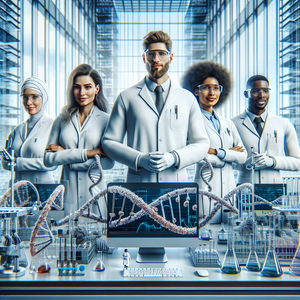The Future of Medicine: Innovative Careers Emerging from City of Hope

Personalized medicine, often referred to as precision medicine, represents a paradigm shift in how healthcare is delivered. It tailors treatment to the unique characteristics of each patient, considering genetic, environmental, and lifestyle factors. At City of Hope, the development of targeted therapies is a growing field, creating a demand for a range of professionals. Example: Genetic counselors are essential in this landscape, assisting patients in understanding their genetic predispositions to various diseases. They interpret genetic test results and guide patients through prevention and treatment options. With advancements in genomic science, the need for skilled genetic counselors is expected to rise dramatically, making this a promising career path.
Telehealth
The COVID-19 pandemic has catalyzed a significant shift toward telehealth, making it an integral part of modern healthcare. City of Hope has embraced this trend, creating numerous opportunities for healthcare professionals to engage with patients remotely. Careers in telehealth encompass roles such as telehealth coordinators, remote patient monitors, and telemedicine nurses. Evidence: A report by McKinsey reveals that telehealth usage has stabilized at levels 38 times higher than before the pandemic. This statistic underscores the importance of having trained professionals who can manage the technological and emotional aspects of virtual patient care effectively. Example: Telehealth coordinators are critical in ensuring that the technology used during virtual visits operates smoothly. They provide necessary support to both patients and healthcare providers, gathering feedback to enhance the telehealth experience. As the healthcare system continues to adapt to this new normal, careers in telehealth are expected to expand significantly.
Genomics
Genomics, the comprehensive study of genomes and their functions, holds revolutionary potential for diagnosing and treating diseases. City of Hope’s investments in genomic research have led to the development of innovative therapies and diagnostic tools, increasing the demand for professionals skilled in this area. Example: Genomic technologists play a crucial role in conducting tests that analyze DNA, RNA, and proteins. Their work is vital for identifying mutations associated with various diseases, thus enabling more precise diagnoses and personalized treatment plans. As genomic technologies advance, the need for these specialists will continue to grow, presenting a wealth of opportunities in the field.
Interdisciplinary Collaboration
A defining feature of these emerging careers is the necessity for interdisciplinary collaboration. Professionals from various backgrounds—ranging from informatics to nursing to molecular biology—must work together to advance patient care. This collaborative environment fosters innovation and enhances treatment effectiveness. Example: At City of Hope, interdisciplinary teams composed of researchers, clinicians, and technology experts collaborate on projects that integrate data analytics with clinical care. This synergy leads to groundbreaking advancements in how diseases are treated and managed, illustrating the importance of teamwork in today’s healthcare landscape.
The future of medicine is promising, with innovative career opportunities sprouting from institutions like City of Hope. As fields such as personalized medicine, telehealth, and genomics continue to evolve, they will create new and exciting roles for aspiring healthcare professionals. City of Hope’s commitment to pioneering research and treatment ensures that those entering these fields will not only find fulfilling careers but also play a pivotal role in shaping the future of healthcare. For individuals seeking to make a significant impact in the medical field, pursuing a career through City of Hope stands as an inspiring and transformative journey.
Genetic Counselor
City of Hope, Mayo Clinic
Core Responsibilities
Interpret genetic test results and communicate findings to patients and families.
Provide guidance on risk assessment, inheritance patterns, and potential health outcomes based on genetic predispositions.
Develop personalized care plans and facilitate referrals to specialists as needed.
Required Skills
Master’s degree in Genetic Counseling or a related field.
Strong communication and interpersonal skills to effectively convey complex information.
Proficiency in genetic databases and counseling software.
Telehealth Coordinator
City of Hope, Cleveland Clinic
Core Responsibilities
Manage scheduling and logistics for telehealth appointments, ensuring a seamless patient experience.
Train healthcare providers on telehealth technologies and protocols.
Gather patient feedback to identify areas for improvement in telehealth services.
Required Skills
Excellent organizational and multitasking abilities.
Familiarity with telehealth software and electronic health records systems.
Strong customer service orientation to assist patients with technical issues.
Genomic Technologist
City of Hope, Illumina
Core Responsibilities
Conduct laboratory tests on DNA, RNA, and proteins to identify genetic mutations.
Operate and maintain advanced genomic technologies, such as next-generation sequencing platforms.
Collaborate with clinical teams to interpret genomic data and support personalized treatment plans.
Required Skills
Bachelor’s degree in Molecular Biology, Genetics, or related field.
Experience with laboratory techniques and bioinformatics tools.
Attention to detail and strong analytical skills for data interpretation.
Clinical Data Analyst (Telehealth)
City of Hope, Geisinger
Core Responsibilities
Analyze data from telehealth interactions to assess patient outcomes and service efficacy.
Develop reports and dashboards to visualize trends and inform clinical decision-making.
Collaborate with healthcare teams to enhance telehealth services based on data insights.
Required Skills
Proficiency in data analysis software (e.g., SQL, R, or Python).
Strong statistical and analytical skills to derive actionable insights from complex datasets.
Understanding of healthcare metrics and telehealth regulations.
Biomedical Informatics Specialist
City of Hope, Stanford Medicine
Core Responsibilities
Develop and optimize data management systems for research and patient care.
Implement informatics solutions that enhance the integration of genomic data into clinical practice.
Collaborate with interdisciplinary teams to improve data accessibility and usability.
Required Skills
Degree in Biomedical Informatics, Computer Science, or a related field.
Familiarity with health information technology standards and regulations (e.g., HIPAA).
Strong programming skills and experience with database management systems.


